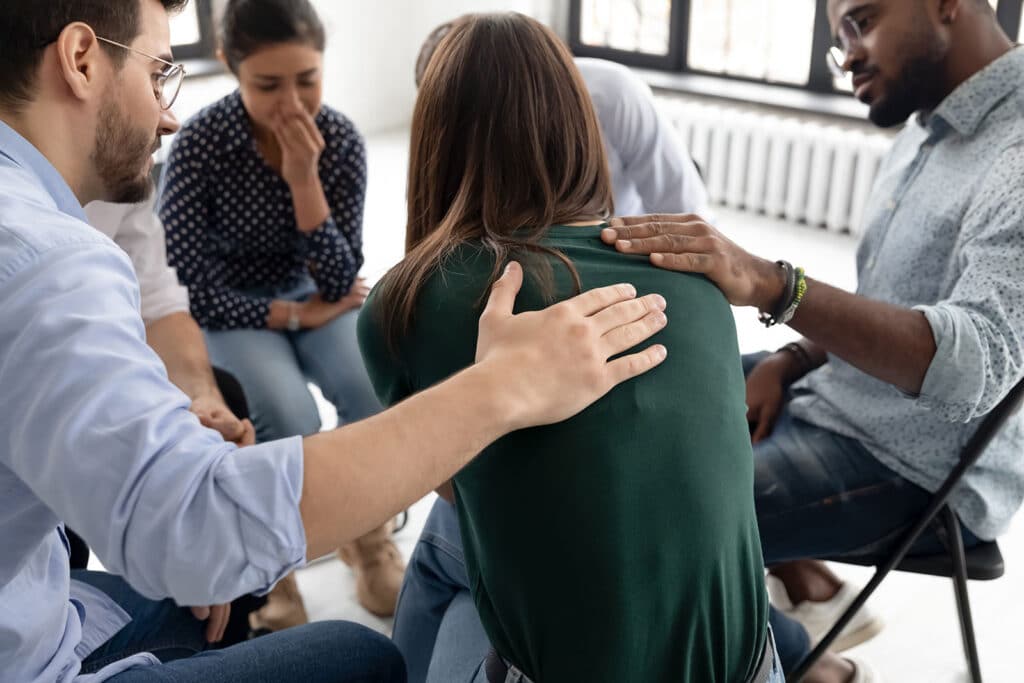Substance abuse touches millions of lives throughout the nation. Those who have a substance use disorder can find their lives falling apart and feel completely out of control. Once a person with a substance use disorder acknowledges that they have a problem, they should pursue treatment as soon as possible.
Partial care program (partial hospitalization program) for addiction treatment is a mixture of residential and outpatient care. Patients spend an allotted day program (day treatment) at a treatment facility but spend the rest of their days at home.
At Garden State Treatment Center, we offer short-term or partial care addiction treatment programs that can help you or your loved ones live a better life and wellness.Read on for more information on how our treatment team providers can assist you, as well as learn the treatment services options available for an intensive treatment of substance use disorders.

Table of Contents
- 1 Understanding Addiction
- 2 Overview of Garden State Treatment Center
- 3 The Role Of Partial Care Addiction Treatment
- 4 Garden State’s Approach To Partial Care Addiction Treatment
- 5 Life In Partial Care Treatment At Garden State
- 6 Success Stories From Garden State Treatment Center
- 7 Transition And Aftercare Post-Partial Care Treatment
- 8 Conclusion
- 9 FAQ
Understanding Addiction
Drug addiction, also known as substance abuse, is a condition that renders a person unable to resist the temptation to consume a certain drug.
Many people associate addiction solely with illegal drugs, such as heroin, cocaine, and methamphetamines. In reality, this behavioral and psychological affliction applies to the abuse of any substance, including prescription medication management.
Despite the clear negative effect that using a drug is having on a person’s health and quality of life, this individual’s urge to keep using it overcomes their will to abstain.
What Causes Drug Addiction
Many factors contribute to addiction. These factors fall under two main classifications: genetic and environmental.
The genetic causes of addiction are related to a person’s family history. If numerous family members have struggled with substance abuse, an individual has a higher propensity for developing this condition as well.
As for the environmental factors causing addiction, they come in various forms. A person’s childhood experiences significantly affect their susceptibility to substance abuse. Those who’ve been through traumas and disjointed family dynamics as children are more prone to addiction.
Additionally, you can become addicted to a drug because of the people you surround yourself with. If you’re consistently around people who use a drug, you’re more likely to follow suit.
Impact of Addiction on Individuals and Their Families
The effects of substance abuse aren’t just limited to the person using drugs. They also touch their loved ones.
Drug addiction impairs a person’s judgment and clouds their decision-making. Therefore, they’re likely to engage in actions that adversely affect those around them.
As a result, family and friends need to help the person with a substance use disorder realize that they have a problem and encourage them to pursue treatment.
That being said, they shouldn’t do so in a way that has the reverse effect of making the person feel alienated and abuse a drug even more.
Recognizing the Signs of Addiction
If you have a loved one who exhibits many of the behaviors below, they may be dealing with drug addiction:
- Mood swings
- Fatigue
- Erratic temper and anger issues
- Defensiveness
- Poor judgment
- Paranoia
Overview of Garden State Treatment Center
Garden State Treatment Center is a facility that offers those dealing with drug addiction a chance to better their lives. Our facility and staff specialize in partial care and intensive outpatient programs.

We are firm believers that the one-size-fits-all strategy doesn’t work with addiction. Each patient requires different types and levels of care, and we cater our treatment plans to fit their individual needs. This is why all our psychotherapy programs start with a comprehensive drug and alcohol assessment.
Furthermore, we understand that many of our patients have underlying issues that cause them to behave this way. We aim to provide our patients with sustainable treatment that addresses their problems at their roots.
Location and Contact Information
You can find Garden State Treatment Center at 350 Sparta Avenue, Suite A201, Sparta, NJ, 07871. To contact our team of licensed professionals, click on the call now button at the top of the page.
We specialize in opiate, benzodiazepine, and heroin addiction treatment. To learn more about how we can help you or your loved ones, be sure to visit our website.
The Role Of Partial Care Addiction Treatment
Partial care addiction treatment involves a patient splitting their time between a treatment center and their home. The patient goes to the treatment center at scheduled slots during the day but doesn’t spend their nights there.
This form of treatment is a hybrid between residential and outpatient treatment. The former involves patients spending an extended period at a treatment facility, while the latter consists of attending scheduled therapy sessions.
Partial care treatment is usually the best option for those who have a significant addiction problem but don’t have the luxury of spending weeks at a facility. For example, a patient with children may not have anyone to leave them with while they pursue residential treatment.
Garden State’s Approach To Partial Care Addiction Treatment
At Garden State Treatment Center, we try to address our patient’s addiction issues from various angles. This holistic approach involves taking the following steps:
Initial Assessment and Treatment Planning
Before we start implementing a treatment program with a patient, we first conduct a comprehensive drug and alcohol evaluation.
Our team of counselors has extensive experience in using physical exams and questionnaires to assess the severity of a patient’s condition.
By doing so, we have a better idea of which treatment plan would be most effective for a given patient. This is because the assessment informs our counselors about the specific nature of each patient’s struggle with substance abuse.
Detoxification Process
The next step in addiction treatment is detoxification. This phase involves ridding the patient’s body of any drug residues.
We do so to ensure the drug has stopped altering the chemical balance of the patient’s brain and other organs.
Withdrawal symptoms are inevitable at this stage. It’s highly important to manage these symptoms and help the patient develop coping skills with them in the right way to avoid a relapse.

We don’t recommend dealing with withdrawal symptoms without guidance because they can get severe and may lead to serious complications.
Garden State Treatment Center currently doesn’t offer detoxification in-house. However, we direct our patients to the ideal facility for them to undergo the process.
Therapeutic Interventions
Our partial care addiction treatment program uses several therapeutic approaches to help patients through the recovery process, be it mental health conditions or substance abuse.
These measures include:
Cognitive Behavioural Therapy
Cognitive behavioral therapy is often used as a mental health treatment for substance abuse and mental health issues.
This form of mental health service therapy teaches our patients to change their thought patterns for the better. Replacing negative thoughts with positive ones goes a long way in helping those struggling with substance abuse to overcome their affliction.
This is because our thoughts and emotions are closely related to our behavior. Being aware of this and controlling their thoughts makes our patients less likely to fall back into drug abuse.
Dialectical Behavioural Therapy
Another therapeutic technique we use at Garden State Treatment Center is dialectical behavioral therapy, a behavioral healthcare option. Like cognitive behavioral therapy, it’s based on the connection between mental and emotional health and drug addiction.
Learning to manage their emotions better allows our patients to deal with the ups and downs of life more healthily. Not only does this reduce the chances of them resorting to drug use to cope, but it also leads to them having healthier relationships.
Acupuncture
We also use acupuncture therapy to help our patients on their journey to recovery.
Acupuncture is a centuries-old technique that uses needles to treat pain and stress by stimulating strategic points in the patient’s body. It’s highly effective in relieving patients’ anxiety and helping them deal with withdrawal symptoms.
You may or may not feel a tingle when the needles are inserted. However, you’ll certainly feel more relaxed and positive in the following days.
Massage Therapy
Our experienced medical staff uses massage therapy with patients to help them get their minds and bodies right.
Our licensed masseuses relax patients’ soft tissue by using their hands and fingers to improve blood and oxygen circulation to these areas.
The resulting reduced pain and stress level allows our patients to deal with the physical symptoms of withdrawal better, especially during the detoxification stage. In turn, they’re less prone to giving in to their urge to use drugs to cope with the pain.
The Role of Peer Support in the Partial Care Setting
Throughout your time at Garden State Treatment Center, there’ll be many others embarking on the same journey of self-improvement. This collective environment will give you the sense that you’re not all alone.
You’ll feel supported by your peers as well as the professional counselors and medical staff tending to your needs. As a result, you won’t feel compelled to revert back to old habits during the time you spend away from the treatment center.

Life In Partial Care Treatment At Garden State
At Garden State Treatment Center, there are many common areas where you can spend time with fellow patients and talk about your experiences and any difficulties you’re facing.
Spending time in these common areas is just as important to your recovery as the time you’ll spend receiving treatment from our counselors and medical staff.
You’ll also get a chance to participate in group activities and skill-building sessions, such as psychoeducational and skill development support group therapy.
Success Stories From Garden State Treatment Center
Garden State Treatment Center has been awarded LegitScript certification. This certification is the highest honor granted to addiction treatment centers to signal their credibility.
Furthermore, our facility is recognized by the Joint Commission for excellence in substance abuse and behavioral health treatment.
However, the most significant sign of our standing as one of the leading addiction treatment centers nationwide is the testimonials and positive feedback we receive from our former patients.
Here are a couple of examples:
“I had a wonderful experience with Garden State from the moment I called in looking for help. The staff was caring and respectful throughout the entire process. The facility is beautiful, and the therapists are incredible and insightful. They go above and beyond for their clients. I highly recommend going there if you really want to change your life.”
Maddy M.
“I cannot express the amount of gratitude I have for Garden State. It’s honestly too much to put into this. From top to bottom, you will not find a better treatment than you will here. They not only saved my life but showed me how to live a life. I’m forever grateful to all of the staff members, not only for their help in my recovery but also for their friendship. The groups are amazing and I apply the lessons I’ve learned into my everyday life.”
Daniel R.
Transition And Aftercare Post-Partial Care Treatment
Once you complete your partial care treatment program at Garden State Treatment Center, the job is still not finished.
Getting clean and maintaining sobriety is no small feat. However, learning how to deal with the trials and tribulations of life without relapsing can be even more difficult.
This is why the Garden State Treatment Center Alumni Program exists.
Enrolling in our alumni program gives you the opportunity to be around other former patients. In turn, this allows you to have a strong support system even after your treatment program ends.
We hold group meetings where our alumni can openly talk about their post-treatment experience and discuss any challenges or difficulties they face living a sober life.
Such groups sustain the sense of collectiveness you have during treatment and help you stay committed to living a drug-free life.
Conclusion
At Garden State Treatment Center, we offer excellent partial care treatment programs that’ll allow you to get sober without bringing your daily life to a halt.
Through support groups and therapeutic tools like dialectical and cognitive behavioral therapy, we’ll do everything we can to help you get your life back on track.
Don’t hesitate to call one of our licensed counselors today.
FAQ
How long does Partial Hospitalization last?
References
- https://sobrietysolutions.com/what-is-outpatient-drug-rehab/
- https://health.clevelandclinic.org/is-addiction-genetic/
- https://www.healthdirect.gov.au/addiction-withdrawal-symptoms
- https://www.gardenstatetreatmentcenter.com/therapy/
- https://www.legitscript.com/certification/addiction-treatment-certification/
- https://www.jointcommission.org/what-we-offer/accreditation/health-care-settings/behavioral-health-care/learn/accreditation-options-certifications/



